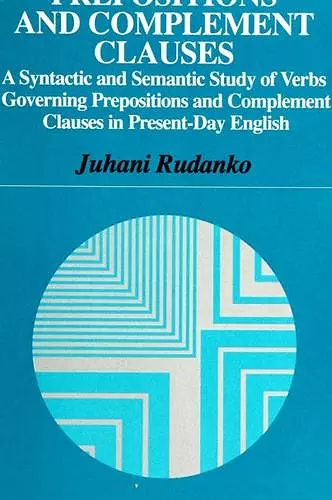Prepositions and Complement Clauses
A Syntactic and Semantic Study of Verbs Governing Prepositions and Complement Clauses in Present-Day English
Format:Paperback
Publisher:State University of New York Press
Published:15th Feb '96
Should be back in stock very soon

Provides a pioneering and data-oriented investigation of the syntax and semantics of important prepositional complementation patterns dependent on the prepositions in, to, at, on, with, and of in present-day English.
This book provides a pioneering and data-oriented investigation of the syntax and semantics of important prepositional complementation patterns dependent on the prepositions in, to, at, on, with, and of in current English. The investigation is based on a sample of matrix verbs that governs the pattern of sentential complementation. The data includes the Brown and LOB corpora, English dictionaries and grammars, and the intuitions of native speakers.
Rudanko sets up taxonomies of matrix verbs and argues that they often can be based on relatively few core classes. He questions whether verbs selecting a pattern also select other patterns of sentential complementation. Noting the quantity and quality of such alternation, he observes how differences in form are linked to differences in meaning. The study of relevant matrix verbs, supplemented with discussion of alternation and other syntactic and semantic properties of the patterns, points to the semantic functions that are associated typically with each pattern of complementation.
"The properties of complement clauses are among the central data of syntactic theory, and this book would be an easy way for researchers to find out things about a subclass of them which, as the author points out, has received very little attention. It is a concise, accurate collection of nonobvious data about the behavior of this class of complements and their embedding predicates. There are many subtle facts and generalizations here, and I find it impressive that a non-native speaker like Rudanko could have come up with them. Yes, Virginia, there is a Universal Grammar." — Gary Milsark, Temple University
ISBN: 9780791428740
Dimensions: unknown
Weight: 327g
211 pages